Where are you from?
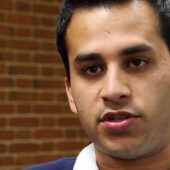 “We all have our own stories to tell whether we’ve been U.S. citizens for our whole lives or we just moved here,” said professor Alessandra Beasley Von Burg. She is leading a project that asks one burning question: Where are you from?
“We all have our own stories to tell whether we’ve been U.S. citizens for our whole lives or we just moved here,” said professor Alessandra Beasley Von Burg. She is leading a project that asks one burning question: Where are you from?
Categories: Happening at Wake, Research & Discovery, University Announcements

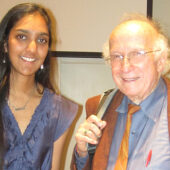 As I listened to Roald Hoffmann's introduction, I was mesmerized by his ability to excel in chemistry, poetry and philosophy. In Hoffmann’s hour-long address as part of the Oakley R. Vail Lecture Series, I learned how these different fields, and really any fields, can intertwine.
As I listened to Roald Hoffmann's introduction, I was mesmerized by his ability to excel in chemistry, poetry and philosophy. In Hoffmann’s hour-long address as part of the Oakley R. Vail Lecture Series, I learned how these different fields, and really any fields, can intertwine.
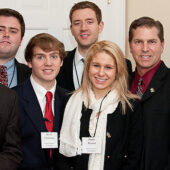 The Wake Forest Ethics Debate Team finished in the top four nationally in its inaugural season. The team, which was formed in the fall of 2011 under the guidance of Charles Lankau of the Schools of Business, also won the N.C. Ethics Bowl.
The Wake Forest Ethics Debate Team finished in the top four nationally in its inaugural season. The team, which was formed in the fall of 2011 under the guidance of Charles Lankau of the Schools of Business, also won the N.C. Ethics Bowl.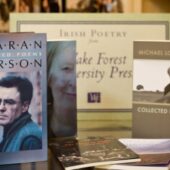 On St. Patrick’s Day, Jeff Holdridge, director of the Wake Forest University Press -- the premier publisher of Irish poetry in North America -- discusses the future of Irish poetry after "The Troubles" and shares his five favorite Irish poems.
On St. Patrick’s Day, Jeff Holdridge, director of the Wake Forest University Press -- the premier publisher of Irish poetry in North America -- discusses the future of Irish poetry after "The Troubles" and shares his five favorite Irish poems. Victor Pauca is well known among the Wake Forest community. Now, thanks to the work of a young journalist, others around the country will soon learn of his inspiring story about finding his voice.
Victor Pauca is well known among the Wake Forest community. Now, thanks to the work of a young journalist, others around the country will soon learn of his inspiring story about finding his voice.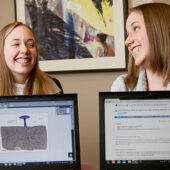 Twins Jessica and Tiffany Blackburn are playing an integral role in the ongoing development of BioBook, an interactive biology e-textbook. The e-book is teaching the sophomore biology majors much more than science, it has also enhanced their writing and drawing skills.
Twins Jessica and Tiffany Blackburn are playing an integral role in the ongoing development of BioBook, an interactive biology e-textbook. The e-book is teaching the sophomore biology majors much more than science, it has also enhanced their writing and drawing skills. Words Awake!, a three-day celebration of writers and writing to be held March 23-25, will celebrate past and present Wake Forest writers and will inaugurate the Wake Forest Writers Hall of Fame. More than 40 alumni will return to share their experiences as professional writers.
Words Awake!, a three-day celebration of writers and writing to be held March 23-25, will celebrate past and present Wake Forest writers and will inaugurate the Wake Forest Writers Hall of Fame. More than 40 alumni will return to share their experiences as professional writers.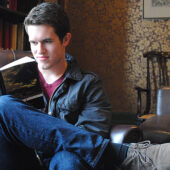 Professor Eric Wilson's latest book, "Everyone Loves a Good Train Wreck," is receiving national attention for his poignant portrayal of people’s inherent fascination with morbid curiosities. From rubbernecking on the highway to watching a horror film, Wilson believes there’s something nourishing in the darkness.
Professor Eric Wilson's latest book, "Everyone Loves a Good Train Wreck," is receiving national attention for his poignant portrayal of people’s inherent fascination with morbid curiosities. From rubbernecking on the highway to watching a horror film, Wilson believes there’s something nourishing in the darkness.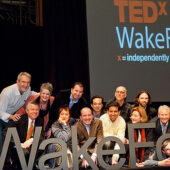 For senior Mariama Holman, the creative director for TEDxWakeForestU, planning the visual design themes with her team required late nights, Skype and a sense of humor. But when all the planning came together Saturday, an audience of 1,400 walked away inspired and exhilarated.
For senior Mariama Holman, the creative director for TEDxWakeForestU, planning the visual design themes with her team required late nights, Skype and a sense of humor. But when all the planning came together Saturday, an audience of 1,400 walked away inspired and exhilarated. Senior elementary education major Nancy Davidson has learned that even one iPad can make a huge difference in the classroom. The results of her experience are consistent with new research by Assistant Professor of Education Kristin Redington Bennett.
Senior elementary education major Nancy Davidson has learned that even one iPad can make a huge difference in the classroom. The results of her experience are consistent with new research by Assistant Professor of Education Kristin Redington Bennett.